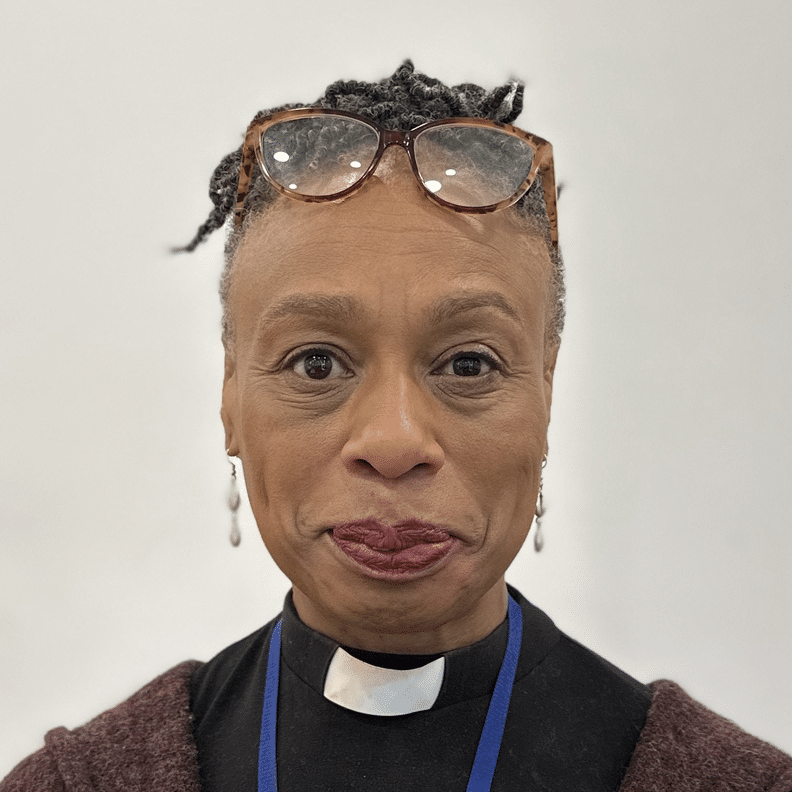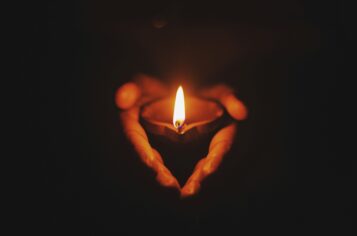
Rev Colleen Shekerie is Chaplain at Birmingham Cathedral, as well as a psychotherapist, artist, and passionate peacebuilder. Emma Crick de Boom, Reconciliation Enabler for West Midlands and Coventry Diocese, sat down with Colleen to talk about how her life weaves together grief, faith, healing, and a deep curiosity about people. The conversation took us through city streets and sacred spaces, into wounds and wonder – and left us with renewed hope about being reconcilers in our hurting and divided world.
Colleen, your work doesn’t officially carry a ‘reconciliation’ in the title, but it’s clear it runs through everything you do. Can you share a bit of your journey?
I’m Chaplain at Birmingham Cathedral – and have been for nearly three years. The role’s broad: sometimes it’s pastoral care, other times prayer, teaching, even deliverance and confession ministry. People bring a lot with them when they walk through our doors. I sit with grief, confusion, anger, but also hope.
Before this, I was a psychotherapist for over 25 years. And somehow, every skill I’ve picked up along the way fits perfectly here. It’s city-centre ministry at its best – and worst. But God, in all God’s humour and wisdom, has placed me exactly where I’m meant to be.
How did your earlier life shape your call to this kind of work?
I’m Caribbean Catholic by heritage and was raised Baptist too. There was always this deep culture of service, of generosity – even when there wasn’t much to give. That shaped me.
Theological college was an intense time. But I kept showing up for people – being present. Not because it was heroic. Just because… that’s what you do. And people would say, ‘Colleen, you’ve got a servant heart,’ and I’d shrug. But it stayed with me. Over time, I learned that reconciliation isn’t about fixing everything. It’s about knowing you can’t be everything to everyone. It’s knowing when to rest. It’s about ministering to yourself too.
You talk about presence and curiosity a lot. Why are those so central for you?
Because when we’re truly present with someone, we say, ‘I see you.’ And that’s healing in itself.
One time, I was preparing a retreat based on the Good Samaritan story, and I had this moment of revelation. Everyone talks about the Samaritan being ‘good.’ But I think the point is, he was there. He didn’t walk past. He stopped, stayed overnight, tended to wounds, paid the innkeeper. Not because he had to. But because love demanded it. That story reminds me that when generosity becomes contagious, when we keep seeing it, feeling it – it changes us. It changes communities. The innkeeper saw it. Others saw it. That kind of presence is infectious.
And yet you remind us that the Good Samaritan wasn’t a superhero. Why does that matter?
Because we often disqualify ourselves. We think, ‘Who am I to help?’ But reconciliation doesn’t require perfection. It requires honesty. Vulnerability. Curiosity.
The Samaritan had wounds too. We all do. I carry a scar from a cat I once rescued. It scratched me and left a mark. But I look at that scar with affection. It came from love. Not all scars are like that, of course. Some come from deep trauma. But healing doesn’t mean forgetting – it means we survived. And when we do the inner work, we can offer healing from our scarred-over places, not our open wounds. And that… that is where transformation begins.
In your ministry, what are the small things that bring about meaningful change?
Slowing down. Asking someone, ‘Have you eaten?’ before diving into deep conversation. Creating space without transaction. Offering a cup of tea, not advice.
Peacebuilding doesn’t start with a strategy. It starts with presence. That’s how people begin to trust. That’s how fragmented lives begin to stitch together again. And when we become aware of the energy we bring – whether it’s kindness, gentleness, curiosity – that energy transforms rooms.
So, what does it mean to reimagine in a world that’s hurting?
To reimagine is to say, ‘I believe things can be different.’ Even when we’re broken. Especially then.
Many people live fragmented lives. Not because they want to, but because pain forced them to. And they hide those pieces deep. Reconciliation invites us to remember – to re-member – ourselves and each other. To gather the loose threads. To say, ‘I see you. You’re still here. You’re not just your pain.’
I see this in the community daily. The cathedral becomes a sanctuary. People walk in – sometimes silently – and what they’re saying is: ‘See me. Help me re-member with compassion.’ And we begin. With presence. With prayer. With small acts of generosity that ripple outward.
Colleen, what encouragement would you offer to readers who are doing the work of being reconcilers too?
Remember to be curious – about yourself and others. Ask ‘where is God showing up in my life creatively? What wounds have shaped me? What power have I forgotten I have?’
Be present. Sit with people. Share food. Listen deeply – not to respond, but to witness. That’s what transforms pain into peace.
And finally, reimagine. Reimagine what the world could be if more of us practiced this kind of love – not dramatic, flashy love, but the kind that says ‘I see you. I trust you. I will walk with you. Even when it’s inconvenient. Especially when it’s inconvenient.’
Our conversation with Colleen has a message of encouragement for all of us who feel overwhelmed by the urgency of bringing peace in our world: that God is at work through us, even when we can’t see the final picture yet. May we continually reimagine where we long to see change, keeping a hopeful vision – and may we practice patience in our presence, trusting that our small acts are part of something bigger.

Rev Colleen Shekerie is Chaplain to Birmingham Cathedral – as well as a Spiritual Director, Pastoral Care Supervisor, Prayer Guide, and Examining Chaplain to the Diocese of Birmingham. Before being called to ordained ministry, Colleen worked in fashion design, mental health, and psychotherapy. She has spent over 25 years supporting people through trauma, bereavement, and emotional healing – often using creativity as a bridge. A passionate advocate for interfaith collaboration, Colleen invites those on the margins to see themselves as deeply loved and divinely made.



